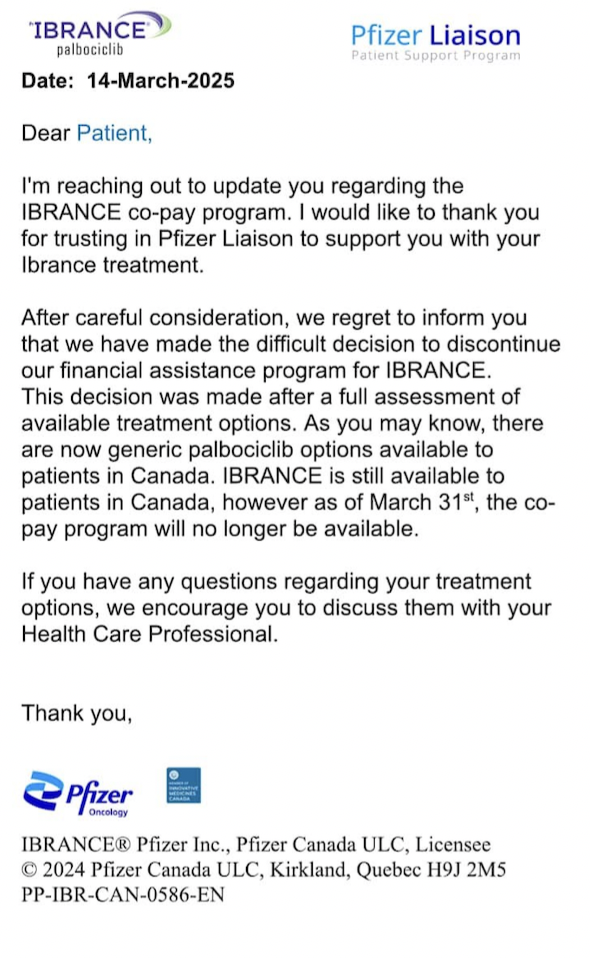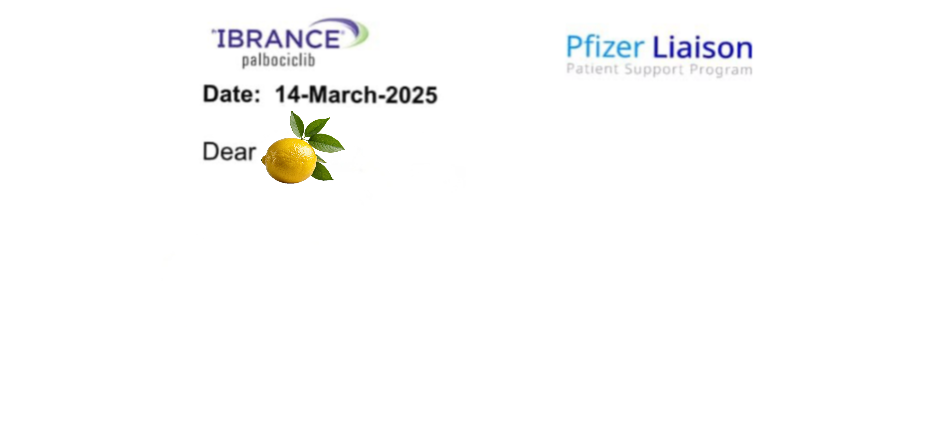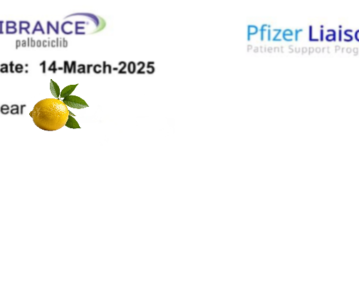I am reaching out regarding your recent communication to Canadian cancer patients about the discontinuation of your IBRANCE co-pay program. While I am not personally affected by this change, many of my friends in the breast cancer community are. However, they are too focused on trying to reach their oncologists to fully grasp what this means for their next prescription renewal. As a cancer patient advocate, I feel compelled to bring their concerns to your attention.
As you know, a cancer diagnosis is both devastating and life-altering. Many people assume that all healthcare in Canada is free, but that is not always the case.[1] Patients are often shocked to learn from their oncologists that the medication they need to extend their lives is prohibitively expensive. IBRANCE costs approximately $185 per pill, taken daily. This equates to over $8,800 per month and more than $65,000 per year—exceeding the average Canadian’s annual salary. Fortunately, oncologists have been informing patients about financial assistance through Pfizer Liaison (formerly the Pfizer Support Program), an award-winning initiative[2] recognized for improving the patient experience. One of the stated goals of this program is to make meaningful improvements in the lives of cancer patients.
In light of that commitment, I would like to address specific concerns about how this communication could have been less insensitive. As both a cancer patient and a business strategist with 20+ years of experience in marketing and communications, I hope my feedback is received as constructive. I am offering this perspective not as someone emotionally or financially impacted by your decision but as someone with lived experience advocating for cancer patients. (Read more below image.)

Areas for consideration
- Timing of the Announcement: The timing of this communication could have been handled with greater care. Most patients received the letter late Thursday or on Friday, leaving them scrambling to contact their oncologists—many of whom were unavailable over the weekend. The strongest bond in a patient’s treatment journey is between them and their oncologist, so timing should have taken this into account.
Additionally, a two-week transition period is extremely short for such a significant change. With Spring Break[3] in March, many patients receiving this message—as well as their healthcare providers—may be less accessible due to vacation time. This creates incremental pressure on both patients and care teams at an already challenging time. - Acknowledging the Emotional Impact: This message is inevitably going to be distressing. However, the way it was communicated could have been more empathetic. Cancer patients are already physically and emotionally exhausted from treatment, side effects, and disruptions to their daily lives. Receiving a generic letter informing them that funding for their $65,500 life-saving medication is being discontinued, with no clear next steps beyond “talk to your healthcare provider,” can be overwhelming.
- Personalization Matters: In the spirit of patient-centricity, please address patients by name and use black font. Cancer patients often feel dehumanized by the medical process, undergoing numerous tests and treatments while coping with difficult side effects. A letter that begins with “Dear Patient” rather than, for example, “Dear Natalie,” reinforces this sense of being just a number. Personalization would make the communication feel more considerate and compassionate.
- Consistency in Pronouns: In the first paragraph, the letter uses the pronoun “I,” creating a sense of a personal connection—even though the patient is addressed generically. However, in the following paragraphs, the tone shifts to the more distant “we,” which feels impersonal and at odds with a patient-centered approach. Consistency would help maintain the warmth and trust that Pfizer Liaison aims to foster.
- Choice of Words and Tone: The first paragraph begins by thanking patients for trusting Pfizer to fund their life-saving medication but immediately follows with the announcement that funding is ending. This contrast may feel contradictory and risk undermining future trust. A more thoughtful approach would be to express gratitude for the opportunity to have supported patients in their care. Framing it as an opportunity helps convey the necessity of its conclusion without eroding trust, which, once broken, is difficult to rebuild.
- Limited Patient Options: The letter assumes patients are aware of alternative treatment options or generic drugs available in their province. However, unlike in the U.S., Canadian patients cannot “shop around” for cancer medications. Each province and territory has its own formulary[4], which determines which drugs are approved for prescription. Many patients remain unaware of alternative medications unless they experience a recurrence or disease progression that requires a complete change in treatment. Even then, such decisions are typically guided by government regulations rather than patient choice. Assuming otherwise is unhelpful.
I understand that eliminating the IBRANCE co-pay program is a business decision, and I do not believe patients begrudge Pfizer for making it—though they certainly wish it were not the case. However, the way the message was received, as seen in the strong reaction from my cancer support communities, suggests that the communication itself caused additional distress. Patients were alarmed to the point that they circulated the letter among themselves, trying to understand its implications.
I hope this feedback is received as intended—constructive and aimed at minimizing the negative impact of future communications on vulnerable individuals fighting for their lives.
Sincerely,
Natalie Kwadrans
I never set out to be a Patient Advocate—it found me when I was diagnosed with terminal cancer. Since my stage 4 diagnosis, I’ve fought for Canadian cancer patients. With no pay and endless hours, I speak up because change matters. If my voice helps, consider supporting me with coffee or groceries by clicking here.
[1] https://www.canada.ca/en/immigration-refugees-citizenship/services/settle-canada/health-care/universal-system.html
[2]https://pmeaawards.com/results/pmea_awards_2017_results/supporting_patients_and_professionals/excellence_in_patient_education_and_support/pfizer_liaison_-_partnering_to_provide_support_and_improve_cancer_patients_lives/
[3] https://prepareforcanada.com/living/life-in-canada/march-break-in-canada
[4] https://cbcn.ca/web/default/files/public/public/Formularies%20list%20Aug%202024.pdf



